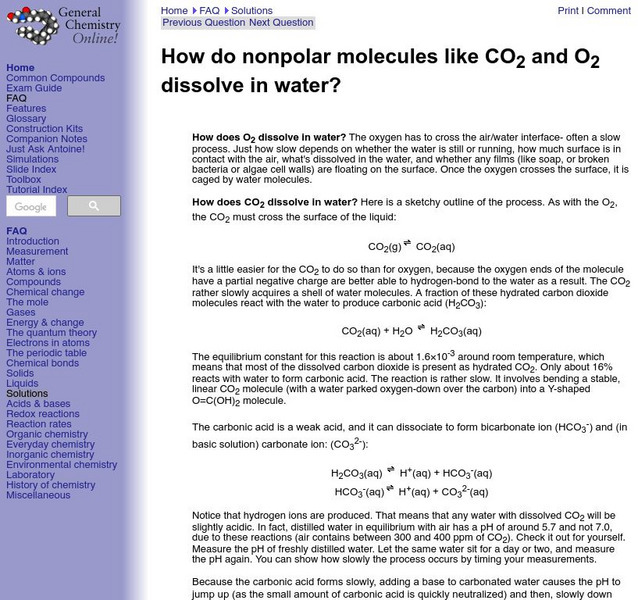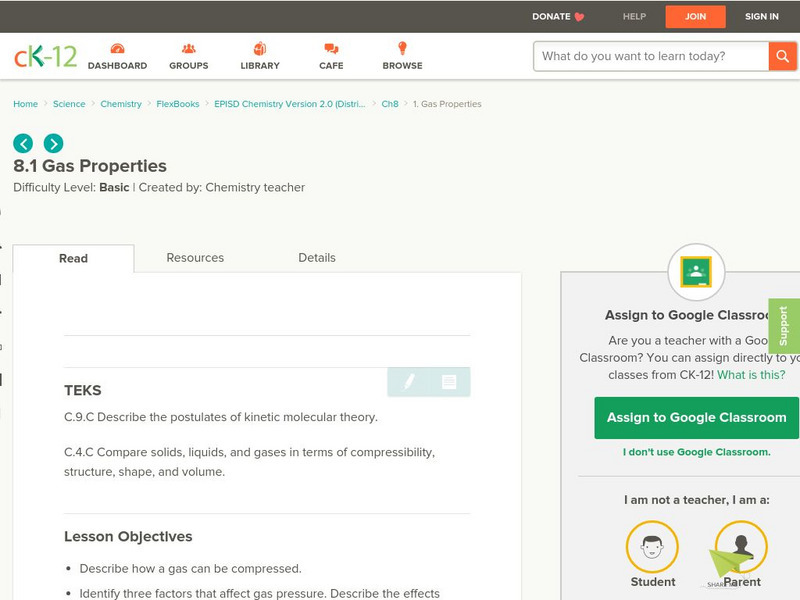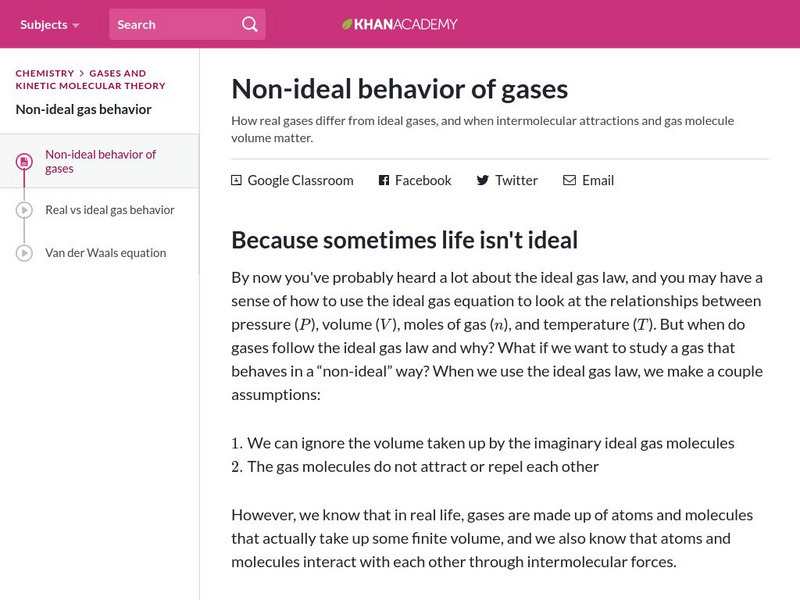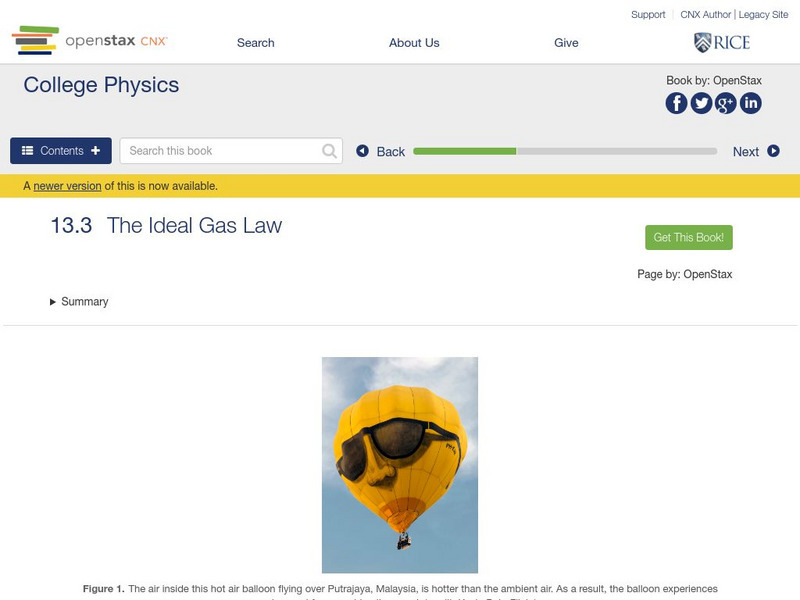Hi, what do you want to do?
Curated OER
Aurora Borealis
Learners discuss what causes the northern lights and the folklore attached to them. They discuss magnetic fields, and use various common materials to discover if ions conduct electricity.
Curated OER
Ozone Pollution: Smog Alert
Students explain ozone pollution and make them aware of how it is formed. They simulate the development of smog and infer how it occurs in nature.
Curated OER
Water 2: Disappearing Water
Students will observe the amount of water in an open container over time and also examine the amount of water in a closed container over time. They then will compare and contrast the sets.
Curated OER
Fallout!
Learners plot the locations of fallout from two disasters that polluted much of the world's air. They plot the ash fallout from the 1980 Mt. St. Helen's eruption to see what the wind patterns in the United States look like overall. Next...
Curated OER
Air Pollution Over Where?
Learners predict the movement of an air borne pollutant using their understanding of air currents. They determine which governments and/or communities should be contacted to be forewarned. They also explore the properties of their...
Curated OER
Water Chemistry
Students engage in a lesson that is concerned with the concept of water chemistry. They conduct research using a variety of resources. Students also consider an experiment to observe how water has the abiility to exist as three different...
Curated OER
Kidney and Related Concepts
In this kidneys worksheet, students review the function of the kidneys including what happens when the kidneys stop working. Students also compare kidney function in fish, frogs, and kangaroo rats. This worksheet has 86 fill in the blank...
Curated OER
Sea of Air #3
In this air worksheet, students determine the major gases found in the earth's atmosphere and review STP and Avogadro's Law. This worksheet has 1 true or false, 2 fill in the blank, and 7 short answer questions.
Curated OER
Water and Ice
Students explore the states of water. In this water states lesson, students observe ice over time and the changes that take place. Students read a related text and draw their observations in a journal entry. Students discuss the...
Curated OER
Daily Edits: Water
In this sentence correction worksheet, students read the sentences and rewrite them by editing them with corrections. Students complete 4 examples.
Curated OER
Planet Structure & Interior
Students compare Jupiter and Earth. In this Earth and space studies lesson, students compare the composition of Earth and Jupiter and analyze how the composition affects the rate at which the planets spin.
Curated OER
Drifting Continents, Dynamic Results
Students plot earthquake and volcano data using a Compass Rose Plotting. They explain the relationship between plate movement and connection. They draw conclusions that earthquakes and volcanoes occur in predictable locations.
Simon Fraser University
Chem1 Virtual Textbook: Velocities of Gas Molecules and Boltzmann Distribution
The General Chemistry Virtual Textbook, or Chem 1, is broken into several sections covering various aspects of topics related to chemistry. This section deals with both Boltzmann Distribution and the velocity of gas molecules.
University of Colorado
University of Colorado: Ph Et Interactive Simulations: Molecules and Light
Do you ever wonder how a greenhouse gas affects the climate, or why the ozone layer is important? Use the sim to explore how light interacts with molecules in our atmosphere.
University of Colorado
University of Colorado: Ph Et Interactive Simulations: University of Colorado: Gas Properties
Pump gas molecules to a box and see what happens as the volume changes, add or remove heat, change gravity, and more. Measure the temperature and pressure, and discover how the properties of the gas vary in relation to each other....
Texas Education Agency
Texas Gateway: Atomic and Molecular Explanation of Pressure and Temperature
Learn how to calculate the kinetic energy of a gas molecule, describe the relationship between the temperature of a gas and the kinetic energy of atoms and molecule, and describe the distribution of speeds of molecules in a gas. The...
Texas Education Agency
Texas Gateway: The Ideal Gas Law
By the end of this section, you will be able to state the ideal gas law in terms of molecules and in terms of moles; use the ideal gas law to calculate pressure change, temperature change, volume change, or the number of molecules or...
Frostburg State University
University of Frostburg: How Nonpolar Molecules Dissolve
This site from the University of Frostburg provides an explanation of the process by which nonpolar molecules dissolve in water.
CK-12 Foundation
Ck 12: Gas Properties
[Free Registration/Login may be required to access all resource tools.] The following online tutorial describes how a gas can be compressed and identifies three factors that affect gas pressure. Students will describe the effects...
Khan Academy
Khan Academy: Non Ideal Behavior of Gases
Find out how real gases differ from ideal gases, and when intermolecular attractions and gas molecule volume matter.
American Chemical Society
Middle School Chemistry: Air: It's Really There
Investigation shows that gas takes up space and has mass, and that the motion of gas molecules is affected by heating and cooling.
Texas Education Agency
Texas Gateway: The Ideal Gas Law
Explore the thermal behavior of gases, in particular, examine the characteristics of atoms and molecules that compose gases. Learn about the ideal law of gases in terms of molecules and moles. Multiple formulas and examples are provided.
OpenStax
Open Stax: College Physics: The Ideal Gas Law
A section in a college textbook exploring the ideal gas law in relation to molecules and in terms of moles. Learn how to calculate the variables in the ideal gas law. Also become familiar with Avogadro's number and how to use it to...
OpenSciEd
Open Sci Ed: Net Logo: Gas Particle Motion and Temperature
This simulation explores the relationship between the temperature of a gas, the motion of the particles in the gas and the changes in the kinetic energies of particles during collisions.



























